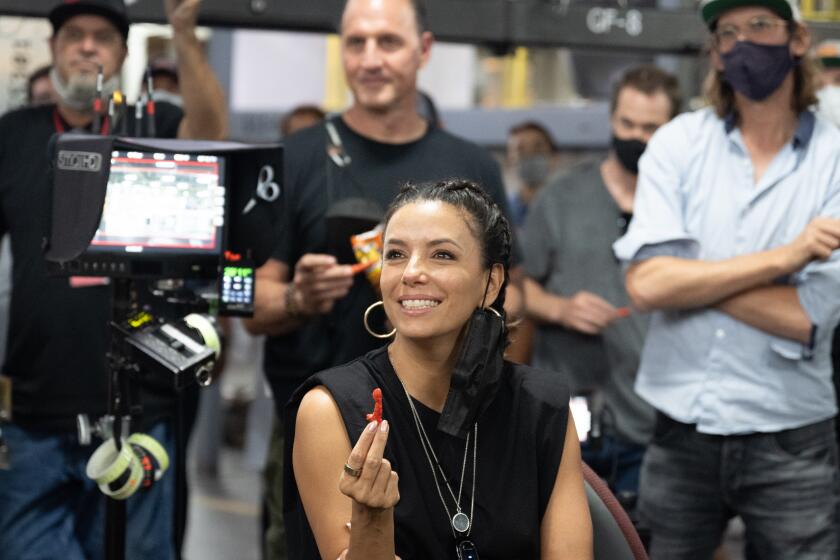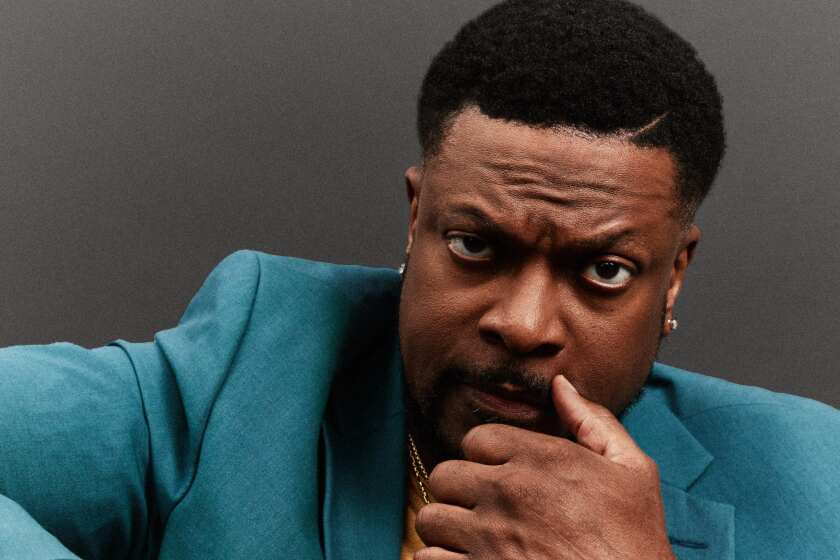The ‘sort of dirty,’ semi-‘cynical’ story behind Hollywood’s hottest new trend
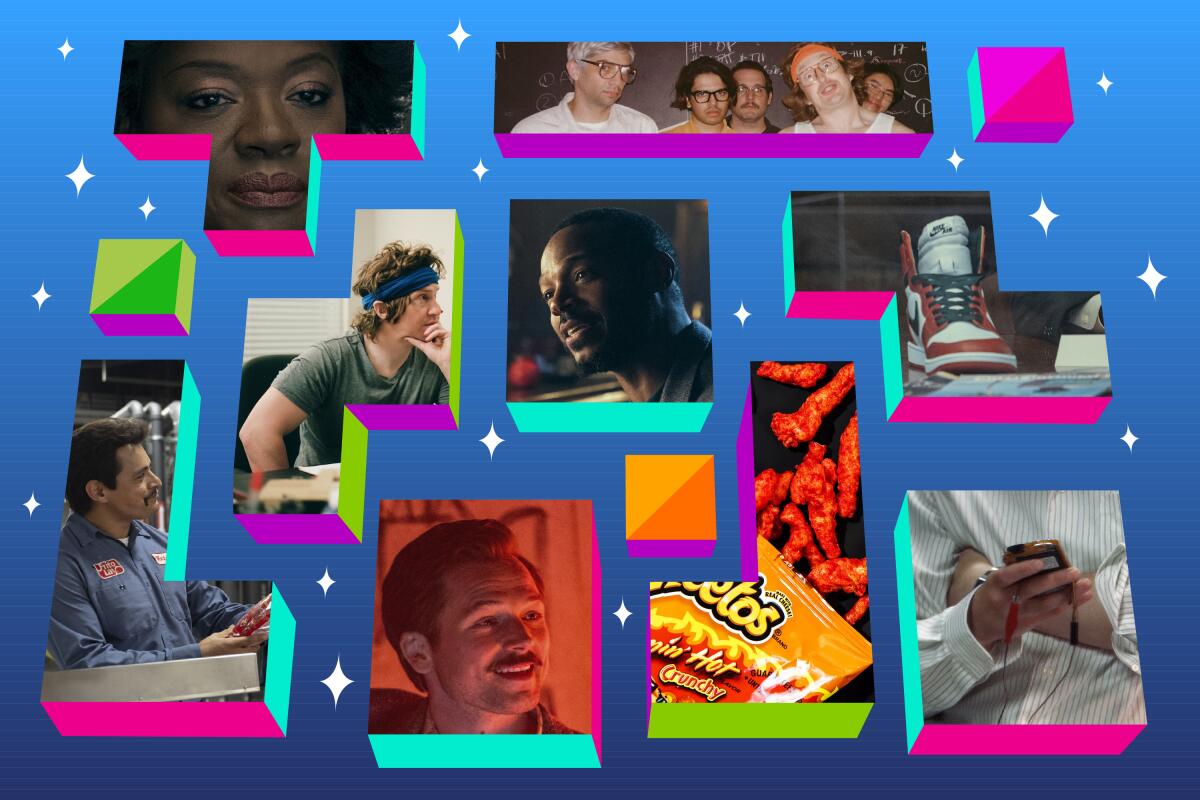
- Share via
Think of the things that make up your life. The stuff. And the deeply emotional attachments we often make to it.
The unexpected intimacies we forge with consumer products are the subtext of a recent spate of corporate origin stories, embracing Tetris, Air Jordans, Blackberries and Flamin’ Hot Cheetos. But Hollywood’s interest in movies about blockbuster business ventures is also, well, potentially good business.
“The cynical answer is that the [intellectual property] chain of title on all these products is a lot easier to pitch to money people, and because everything is about IP — you’re either basing a movie on an article or a book or something — of course the people at CAA and William Morris, etc., were like, ‘Well, wait a minute, what about products?’” said Matt Johnson, director and co-writer of “BlackBerry,” asked to explain the trend’s emergence. “And so I think this is just the beginning of what is probably going to be a flood, provided there’s a market interest.
‘We never set out to tell the history of the Cheeto,’ Longoria said. ‘We are telling Richard Montañez’s story and we’re telling his truth.’
“But let me answer it not cynically, because we just happen to live in a world where all the modern successes are products,” Johnson added. “We do live in a world where the products that have been invented have changed the way that we live. You can be cynical about it and be like, ‘Oh, this is so stupid. Why are we celebrating this?’ But then look in the mirror. Are you using a smartphone? These things have shaped you whether you want them to or not. It’s the cultural backdrop that we live in. It’s the water we swim in.”
In theaters Friday, “BlackBerry” tells the story of the titular mobile device — which accounted for 45% of the cellphone market at its mid-aughts peak, and now accounts for 0% of it — through the intertwined personalities of founders Mike Lazaridis (Jay Baruchel) and Doug Fregin (Johnson) and their business partner Jim Balsillie (Glenn Howerton).
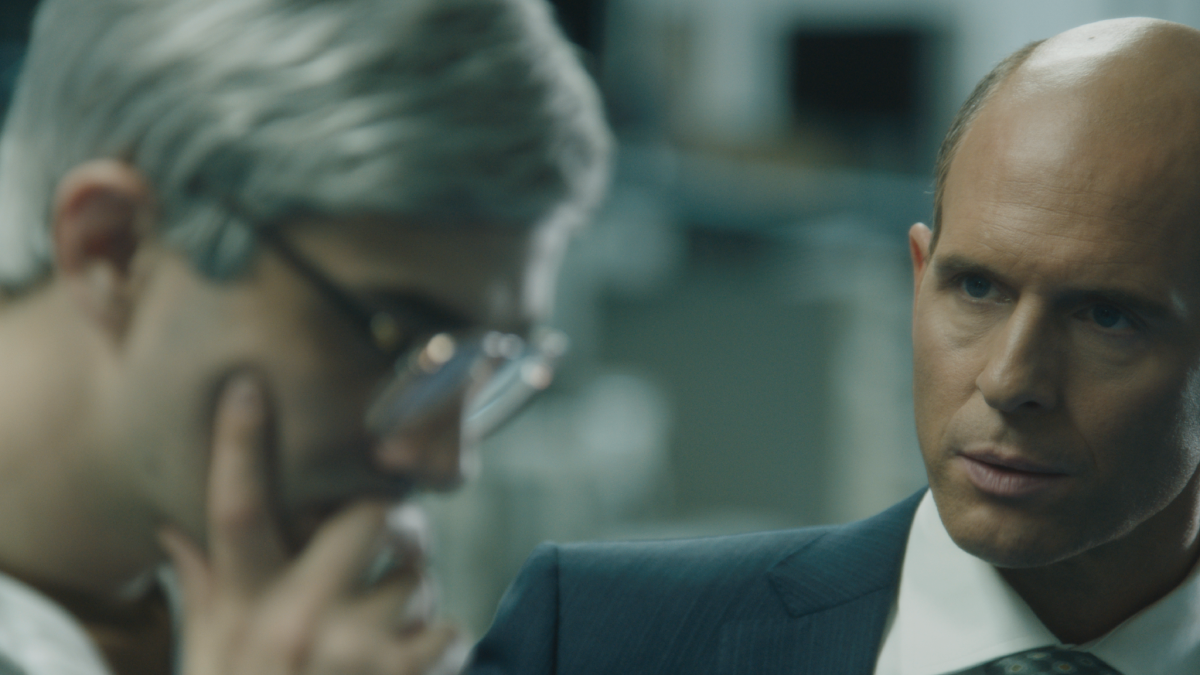
That the film is about a discontinued product is a testament to the deeper connection such items can create with consumers, making them ripe targets for storytelling: We want to know not only how they came to be, but also how they came to achieve such places of prominence in our lives.
“They’re not just products, they’re brands. They’re vessels of meaning and they conjure up thoughts in the minds and hearts of people,” said Marcus Collins, clinical assistant professor of marketing at the University of Michigan and author of the new book “For The Culture: The Power Behind What We Buy, What We Do and Who We Want To Be.” “You need some folklore around it.
“These brands are consecrated in our minds and in our lives,” said Collins. “We want to hear stories about [them]. We want to be closer to [them]. Stories are the currency of culture and it brings us closer to better understanding what these things mean.”
The actor talks about scripting his ‘Air’ character, Howard White; the prospects for ‘Rush Hour 4’ and returning to ‘Friday,’ and more.
Such recognition played a key role in the making of Ben Affleck’s “Air,” the story of how Nike came to sign NBA rookie Michael Jordan and launch the now-iconic Air Jordan line, in theaters now and streaming on Amazon Prime Video on Friday. The film’s familiar brand names helped screenwriter Alex Convery — a little-known writer working on a spec script — leap it to the top of people’s to-read piles.
“I call them ‘big little movies,’” Convery said. “It’s just a small movie in execution, it’s a movie about a shoe deal, and it’s people in rooms talking. There’s not CGI explosions and guns and all of that. But the big part of that equation is really important. And that is where Nike and Michael Jordan and the shoe itself come into play. Because everyone knows who Michael Jordan is. It’s an ability to tackle something that hopefully will have a lot of reach with people who know the story, but executable in the way that it’s not a Michael Jordan biopic, it’s not the tell-all tale about Nike.”
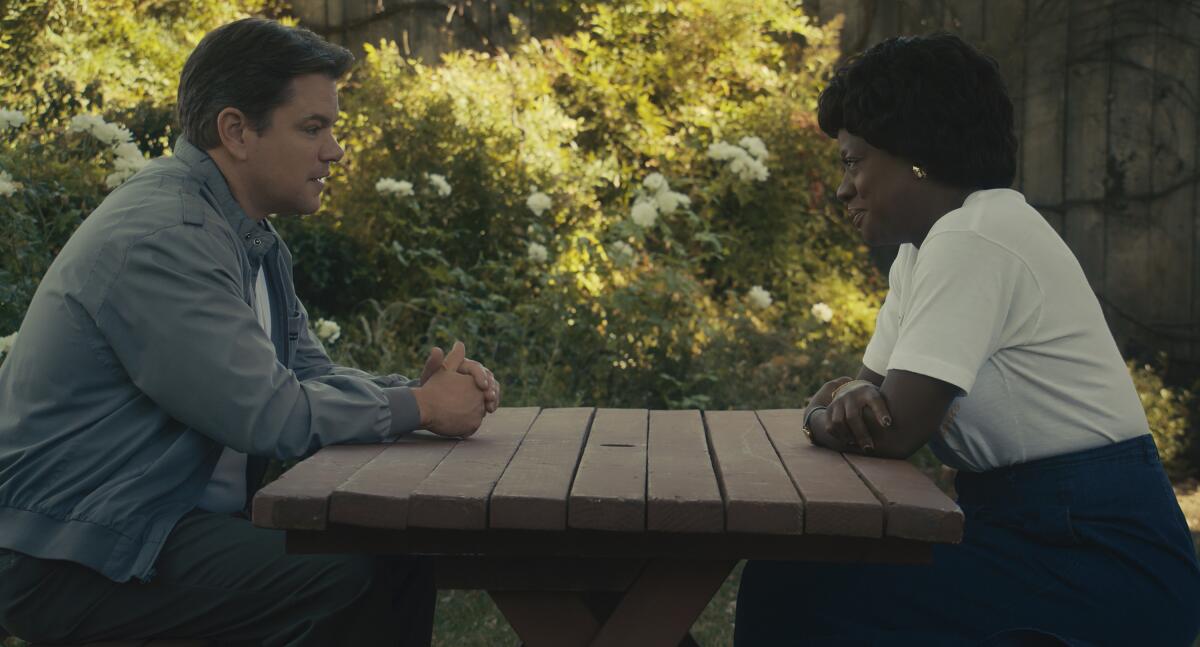
Convery described the story as “a Trojan horse” for the way in which audiences may initially be drawn in by the story of Nike, Michael Jordan and a shoe, but eventually will discover the film is actually more focused on a Nike executive, Sonny Vaccaro (Matt Damon), and Jordan’s mother, Deloris (Viola Davis).
“It’s not about the thing, it’s about the people,” said Convery. “And there’s something interesting about those people that got the story to a point where everyone knows the product or the brand or whatever. And I think it actually presents for interesting drama because it gives you a lot of ability to have your characters trying to say something but not being able to say it and disguising it with talking about shoe deals, business gibberish. But you’re really talking about your struggle as a person.”
Richard Montañez has for years told a story of how he dreamed up Flamin’ Hot Cheetos while working as a Frito-Lay janitor. The archival record, former employees and Frito-Lay itself say otherwise.
The sentiment was echoed by Linda Yvette Chávez, co-writer on “Flamin’ Hot,” directed by Eva Longoria. The film, which begins streaming on Hulu and Disney+ on June 9, depicts Richard Montañez, a Mexican American janitor in a Frito-Lay factory who rose to become an executive at the company, and who has long claimed to have invented Flamin’ Hot Cheetos. (A 2021 Times report debunked his version of events.)
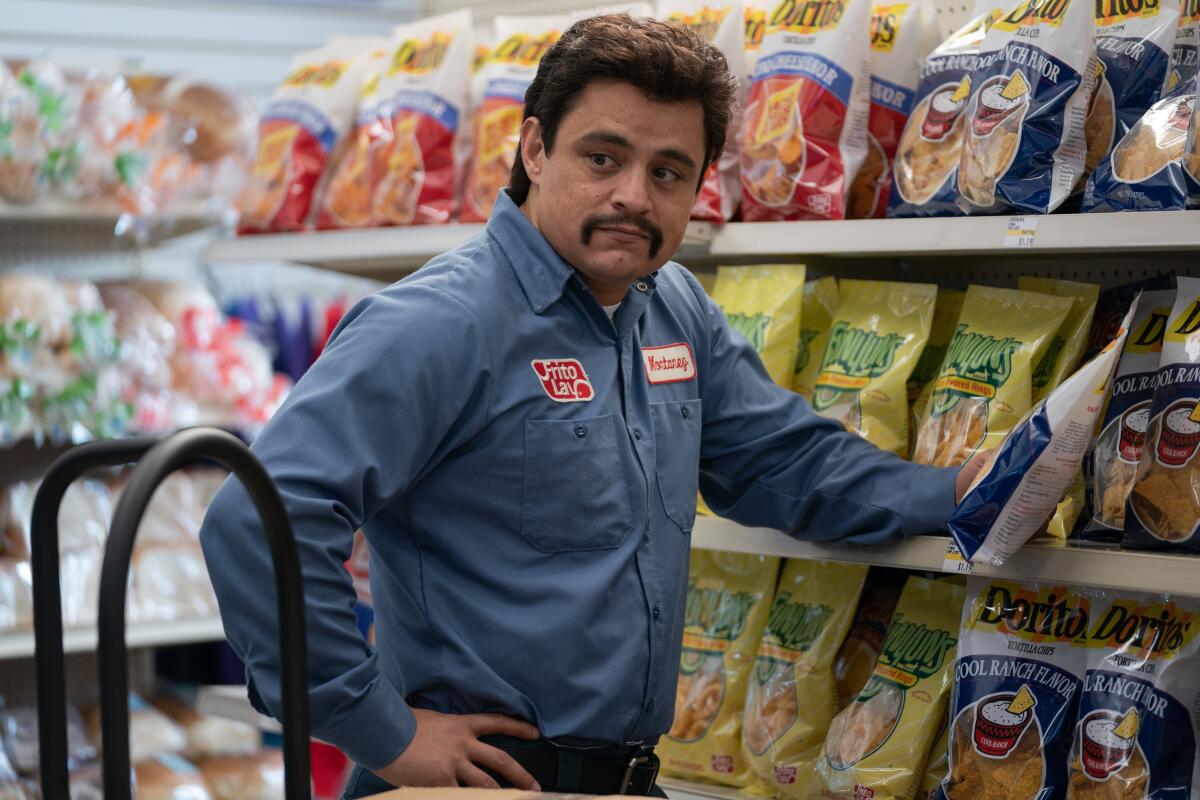
“As much as I love Flamin’ Hot Cheetos, my process with this script was about bringing out the human story behind the product,” Chávez wrote in an email. “No one wants to watch a movie where all you see are Cheetos coming off the factory line. But the reality was we do have to spend a lot of time in that factory and I knew the only way to make it exciting was to anchor the story in people we could root for.
“Every part where people hope, dream, and fear — where relationships can light or put out your inner fire — that’s what we’re signing up for, and that’s what makes the product’s story interesting to audiences in the end. It’s not the product itself,” said Chávez. “The nostalgia for the product is what brings us in, but it’s the people behind it dreaming, innovating and going into the unknown that captures our attention.”
Ben Affleck’s first directorial effort since ‘Live by Night’ stars Matt Damon as the Nike basketball guru who spearheaded a landmark celebrity endorsement deal.
That need for an entry point is what propelled the team behind “Tetris,” including director Jon S. Baird — who cited films like “The Big Short,” “Argo” and “Uncut Gems” as inspirations for the film’s farcical, anxious tone — to change the title from “Falling Blocks.”
“I feel sort of dirty saying it, but it’s about brand recognition,” said Baird. “Ultimately you want as many people to see your film as possible. And I think that when you do a film about an existing product, you’ve automatically got a built-in audience, and that helps in the marketing and that helps in the audience awareness. It lights a little kernel of interest in what they’re maybe going to see next, whether it’s on streaming or whether it’s in the movies.”
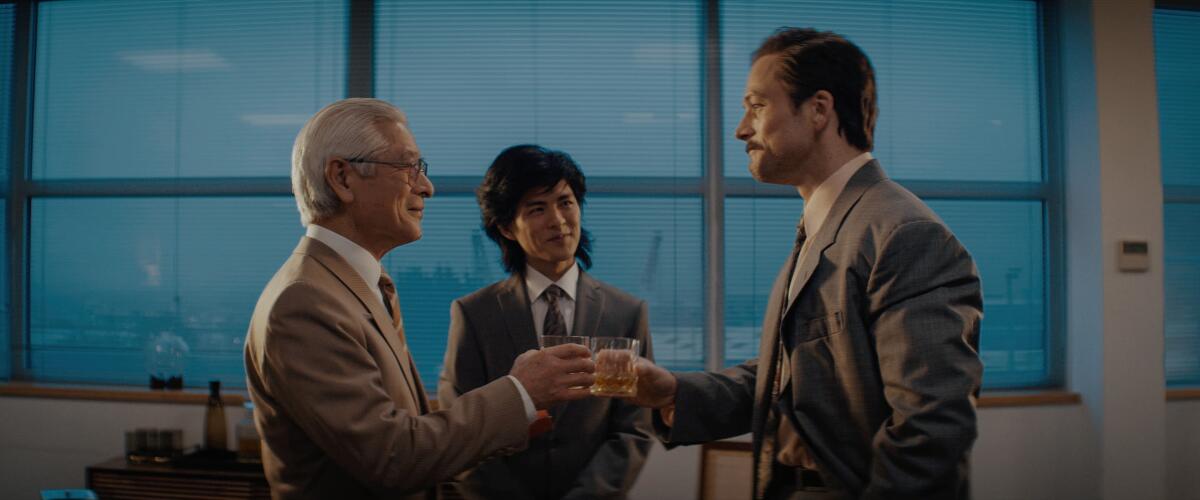
As for these separate product movies coming out at the same time, Matthew Vaughn, a producer on “Tetris” who is also behind the “Kingsman” series and the upcoming “Argylle,” said with a laugh, “Well, Hollywood hunts in packs.”
Vaughn added, “In a world of [virtual reality] coming and [augmented reality] and video games and Zooms and everything, this digital age that we are in, humanity becomes a thing we crave even more. So I think real stories about real humans doing human things in a time that’s sort of robbing humanity of humanity — in a weird way, stories about human endeavors become a bit more interesting, a bit more nostalgic.”
For all the talismanic power of the brand names themselves, though, the mechanics of business, the culture of meetings and the rhythms of phone calls can be difficult to dramatize — which means walking a fine line between fidelity and poetic license.
The complete guide to home viewing
Get Screen Gab for everything about the TV shows and streaming movies everyone’s talking about.
You may occasionally receive promotional content from the Los Angeles Times.
“I have no knowledge or expertise in business, in stock options, in tech. Not only do I have no expertise, I have no knowledge, but I do really understand people and I love them,” said “BlackBerry’s” Johnson. “The challenge was finding a way to make it so that the technical aspects of the film would still be grok-able by a general audience and not be repellent. There’s nothing narratively worthwhile in how a cellphone works, how data management works.
“Whereas the story, the narrative arc of them as people is eternal,” said Johnson. “It is as relevant today as it will be a thousand years from now and as it was a thousand years previously. Men are always going to make these mistakes. They’re always going to have these ideas about themselves. They’re all going to always want more than what they can grasp. Björk was asked, ‘What’s your job?’ And she said, ‘My job as an artist is to connect the myths of my ancestors with today.’ And that really stayed with me.”
There are still more product-based movies on the horizon, from director Greta Gerwig’s highly anticipated “Barbie” this summer to projects such as Kristin Gore and Damian Kulash’s “The Beanie Bubble,” about the brief craze around Beanie Babies, or Jerry Seinfeld’s “Unfrosted: The Pop-Tart Story” further down the line. All look to in some way capitalize on the recognition of well-known products and audiences’ attachment to them.
“That’s what brands are meant to do,” said Collins, author of “For the Culture.” “The strongest brands transcend the value propositions of the product and operate at an ideological level because that ideology becomes... [a] mechanism for me to pour my soul, pour my identity into. This is what brands have always been for, moving from being a mark of ownership to being a mark of identity. And we pour so much into it because they’re extensions of ourselves.”
More to Read
Only good movies
Get the Indie Focus newsletter, Mark Olsen's weekly guide to the world of cinema.
You may occasionally receive promotional content from the Los Angeles Times.
